Electric bus, main fleets and projects around the world
Electric bus adoption in public transport urban fleet is growing all over the world. It started in China, and it has taken a few years for other regions to start the transition. But now Europe is booming: the year 2019 will be remembered as the year when the electric bus sales volumes definitive ramp up. While […]
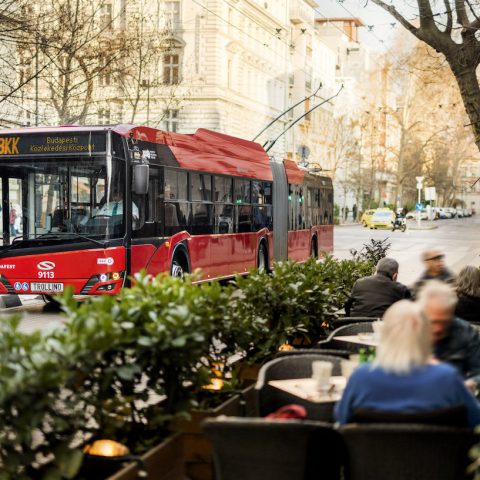
Electric bus adoption in public transport urban fleet is growing all over the world. It started in China, and it has taken a few years for other regions to start the transition.
But now Europe is booming: the year 2019 will be remembered as the year when the electric bus sales volumes definitive ramp up. While in 2018 the European electric bus market increased of 48 per cent compared to 2017, the year 2019 saw a tripling in the number of electric bus registration in Western Europe. And in 2020, the year of Covid, the battery-electric bus market in the same region increased of 22%: 2,062 e-buses were registered. What is worth mentioning, six European countries in 2020 have registered a number of zero emission buses (battery-electric plus fuel cell buses) accounting for over 25% of the Class I registrations.

Electric bus market in Europe year 2021 and 2022
Electric bus registrations increased of 48% in 2021 compared to 2020 in Europe. 3,282 e-buses were delivered last year, bringing to over 8,500 the vehicles registered in the continent since 2012. What is worth mentioning, in 2021 for the first time as many as three European countries registered over 500 e-buses, with Germany leading the shortlist (555 units) followed by UK (540) and France (512).
| YEAR | BATTERY-ELECTRIC BUS REGISTRATIONS | TREND YoY |
| 2020 | 2,062 | +22% |
| 2021 | 3,282 | +48% |
| 2022 | 4,152 | +26% |
| 2023 H1 | 2,567 | – |
A total of 1,767 electric buses were registered in Europe in the first half of 2022, including as many as 242 signed VDL (13.7 percent of the total). VDL was then back at the helm of the top e-bus sellers in Europe with BYD – ADL closely following with 221 units. Third, surprise!, Yutong with 217 e-buses delivered. Then the Mercedes eCitaro, Iveco Bus, MAN. Only seventh, Solaris. In Denmark 3 out of 4 newly registered buses in 2022 are electric.
At the end of 2022, Yutong ranked first in the electric bus market 2022 in Europe. Quite surprisingly, it must be said. Nothing new in second and third position, where we find the joint venture Alexander Dennis/BYD and Daimler Buses. The electric bus market in Europe has been growing 26 per cent in 2022, up to 4,152 units registered (it was 3,282 in 2021, with a growth of 48% on 2020).
What about 2023?
Zero-emission bus registrations in Europe grew from around 1,400 in the first half of 2021 to around 2,600 in the first half of 2023, representing a +85% in two years time. What is more, their share in the total city bus registration was 22% in 2021, became 30% in 2022, and this year, based on H1 figures, is 37.5%.
With 2,567 battery-electric buses registered in the fist half of 2023, the European e-bus market is growing 45%. Over a third of the city bus market (37.5%), on a European level, is covered by zero-emission buses (battery-electric and fuel cell).
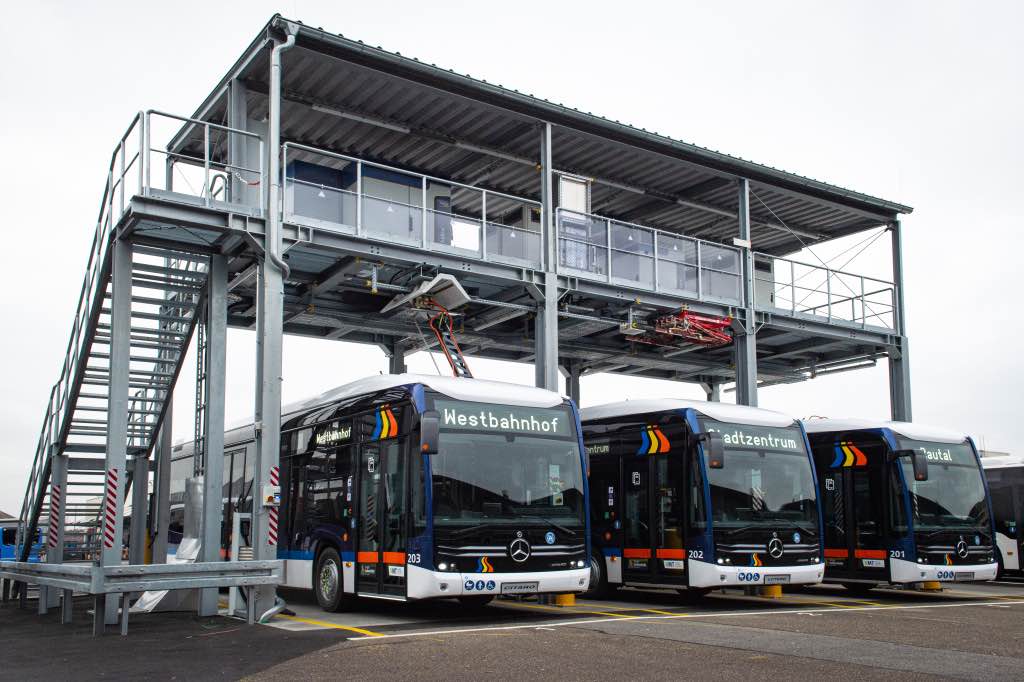
Electric bus deployment forecasts according to studies
As highlighted during an interview we had with Aleksandra O’Donovan, Head of Electrified Transport at BloombergNEF, «Deployment of e-buses in the municipal environment continues to increase. We now expect municipal buses to go electric faster than any other segments of road transport, with e-buses comprising over 67% of the global bus fleet in 2040. (…) We expect municipal e-buses to rise from 417,000 units in 2019 to over 645,000 units in 2025 (about 39% of the global municipal bus fleet)».
According to another study released in 2021 and signed by financial consulting company ING, a third of the 200,000 buses in European public transport will be zero-emission by 2030. At that year, zero emission buses will cover two thirds of the new city bus registrations. ING clearly reads: «This will be the decade of change».
Global electric bus market to reach 670k units in 2027 (from 112k in 2022), according to study by MarketsandMarkets. Quoting from the report: «The North America which includes US and Canada is projected to be the fastest-growing market during the forecast period. The increasing demand for electric mass transit solutions, renowned OEMs expanding in the region, and government support are factors driving the North American Electric Bus Market.
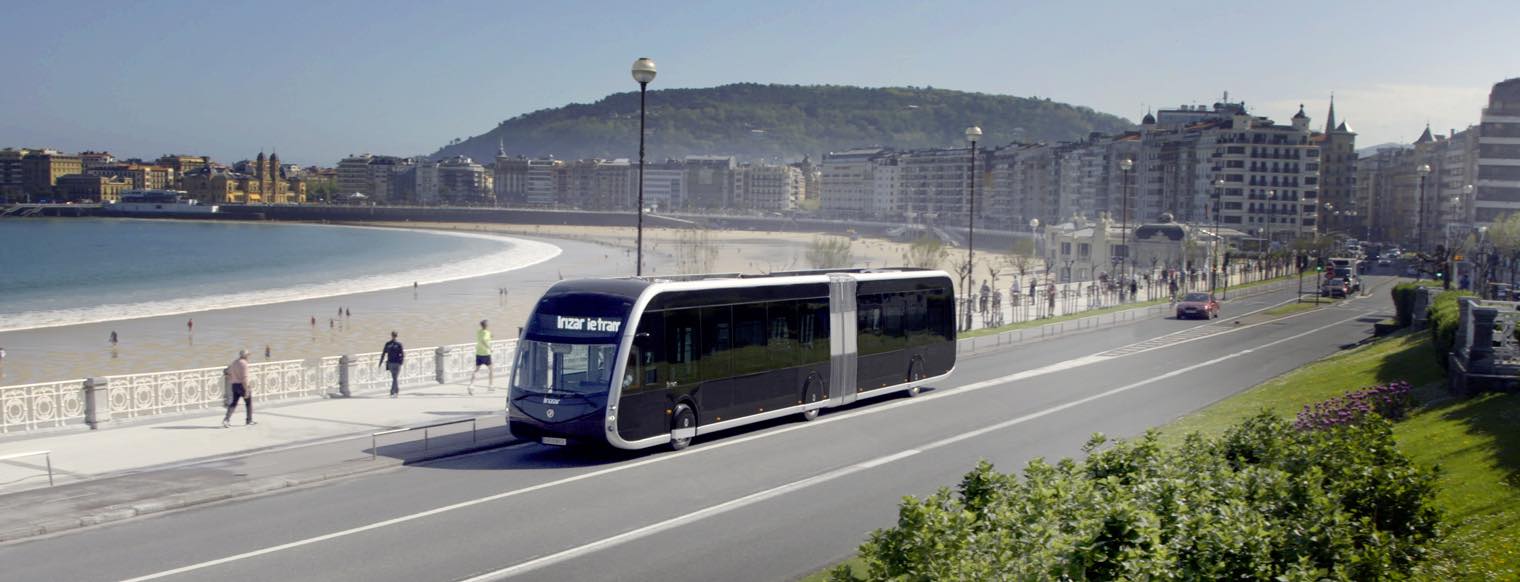
A growing number of electric buses running worldwide
Also India (70,000 buses sold in 2017) is a market with big potential, when even a small part of the orders will be electric. By 2025, the research company Interact Analysis forecasts that «India will account for more than 10% of the total annual demand for electric buses globally, which is more than Europe and North America combined». A share between 11 and 13% of new bus sales in 2025 are expected to be electric in India, according to a recent research by investment agency ICRA Limited. The penetration of zero-emission buses stood at 5-6 per cent during the first half of 2023.
The Indian e-bus market witnessed a growth of 65% in 2022. However, reporting from Reuters found in late 2022 that “Indian banks are reluctant to lend to electric-bus makers”.
Electric bus market in the US
And United States? Market penetration was at about 0.5% of the total U.S. public transit bus market at the end of 2017, but in the same time 9% of all transit agencies either had electric buses in service or on order. Things are moving fast! Anyhow, according to BloombergNEF figures, at the end of 2019 in the US «around 450 of the nearly 75,000 municipal buses on the road were e-buses». Zero emission bus deployment in the US has been growing 27% in 2021, up to 3,533 buses (on the road and on order).
According to Dan Raudebaugh, Executive Director for the Center for Transportation and the Environment (CTE), in October 2020 there were «slightly over 1,000 zero-emission buses deployed in the US. I think the rate of increase of that figure may slow some due to COVID, like everything else. In the long term, I think this market will continue to grow rapidly. In fact, I think the transit market may be the first major vehicle market to completely switch to zero emissions».
China leads the way
When it comes to electric buses, Chinese figures are striking. The ‘Electric Buses in Cities’ report by Bloomberg New Energy Finance, published in spring 2018, tells about this wide-ranging revolution. In 2016 China was able to register 340 electric city buses every single day. In the same year 2016, Europe put about 70 buses on the road each day, regardless of the category (urban, intercity, coaches) and the kind of fuel. In this epochal change toward electric buses adoption, Europe and United States still have the role of background actors.
Electric bus, 17 percent China circulating buses
Still according to Bloomberg New Energy Finance, at the end of 2017 there were 3 million city buses in operation worldwide; of these, 385,000 belong to the category of electric bus. The incidence on the global fleet is therefore 13 per cent.
However, this figure is misleading. In fact, almost all of the vehicles operate in China. Therefore, it would be more correct to say that in China the share of electric buses on the circulating city buses is already 17%. Elsewhere, we are still dealing with decimals.
In China sales rose from 69 thousand units in 2015 to 132 thousand in 2016; 2017 marked a significant step backwards, following the reduction in subsidies: 90 thousand full electric buses and 16 thousand hybrid plug-in buses have been registered.
The electrification of Chinese bus fleets
The plans for electrification of Chinese public transport are quite ambitious. To give some known examples, the city of Shenzhen by the end of 2017 had committed to reach 100 per 100 of electric bus vehicles in operation (16,500 buses), Beijing aims at the goal of 10,000 by 2020, starting from 1,320 last year. In 2018 Guanzhou issued two tenders, the first for 3,138 and the second for 1,672 battery electric buses. A total of 4,810 electric buses. The winner? BYD will provide 4,473 units of electric bus. In September 2018, Yutong Bus declared it has achieved a total sales volume of 90,000 new energy buses in France, UK, Bulgaria, Iceland, Chile, and China Macau among others (Yutong’s annual sales volume, including every kind of bus and coach, exceeds 70,000 units).
According to data from the China Bus Statistics Information Union, in the context of the overall weakness of the Chinese bus market, which decreased by 13.5% in the first three quarters of 2018, a total of 55,658 new energy buses were sold in the Chinese market, with a year-on-year increase of over 20%. In 2019, the Chinese bus market witnessed a decrease of 11 per cent on 2018.
The largest electric bus order so far has been signed in December 2020 and sees Yutong as the industry supplier: the Chinese brand has received a record order for as many as 1,002 buses (yes, you read it correctly). 741 of them will be electric, making it the largest order of EV buses ever. The contract comes from Mowasalat, the Qatar public transport company, that will provide commuting services for the FIFA World Cup Qatar 2022.
Latin America, the transition to electric buses is now!
Between 2018 and 2019 two important south American cities announced big plans of transition to electric buses of their public transport fleet. Chile aims to have the second largest electric bus fleet in the world after China. Santiago de Chile already received 200 electric buses from China: half are Yutong branded, the other half are BYD buses. Santiago paved the way, Medellin follows. A few weeks after the delivery of 100 BYD electric buses to Santiago, the Colombian city ordered 64 zero emission buses from BYD, thus making the first steps towards the first electric fleet in the Latin American country.
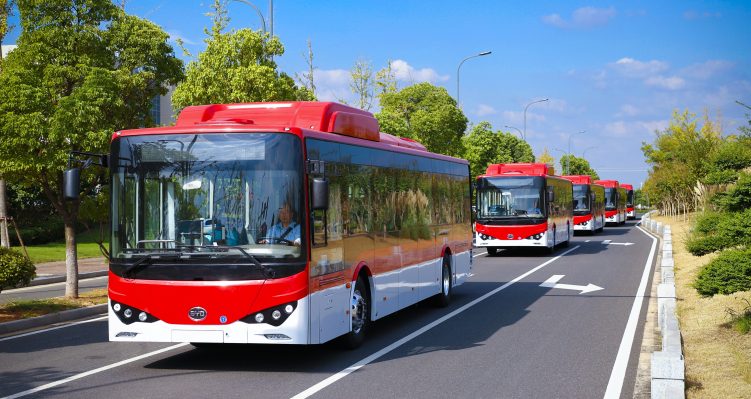
A project to speed up electric bus adoption in South America
«Shift all new bus procurements in leading Latin American cities to Zero Emission technologies». It’s the ultimate goal of ZEBRA project, carried out by ICCT and C40 with focus on the South American cities of Medellin, Mexico City, São Paulo, Santiago de Chile.
In late 2022 São Paulo’s Transit Agency SPTrans (over 13,000 buses) has banned the procurement of new diesel buses in the city. Earlier in the same year, Colombia’s capital city Bogotá stopped procuring fossil-fuelled buses in the city. The news is reported on local media and on C40 website. It is expected that by the end of 2024, São Paulo will have at least 2,600 e-buses operating on municipal lines.
Volvo Buses in 2023 has begun the first demonstration of its 100% electric city bus in real operation in Latin America. The same year saw the entry in the Mexican bus market of Irizar e-mobility.
Forecasts on e-bus deployment in Latin America
25,000 e-buses are expected to be on Latin American roads by 2030. Recent data indicates a growth of over 100% in the number of electric public buses between 2020 and April 2023 in the region, marking a pivotal moment in the quest for sustainable urban mobility.
As of late 2023, according to the E-Bus Radar, electric buses constitute 4.5% of the total bus fleet in the 32 cities under examination in the new study “Pipeline of Electric Bus Projects in Latin America“, commissioned by C40 in conjunction with the Clean Transport Finance Academy 2023.
The research estimates the deployment of over 25,000 e-buses by 2030 and a staggering 55,000 by 2050. This projected growth comes with a substantial investment of $13.2 billion.
Electric buses in Europe. What’s going on?
The beginning. The electric bus revolution in Amsterdam region
At the end of 2018, the largest fleet of electric bus in Europe is the one operated by Connexxion around Schipol airport. VDL Bus & Coach has supplied 100 electric buses to Connexxion (part of Transdev) for the Amstelland Meerlanden concession, which were put in service on 1 April 2018.
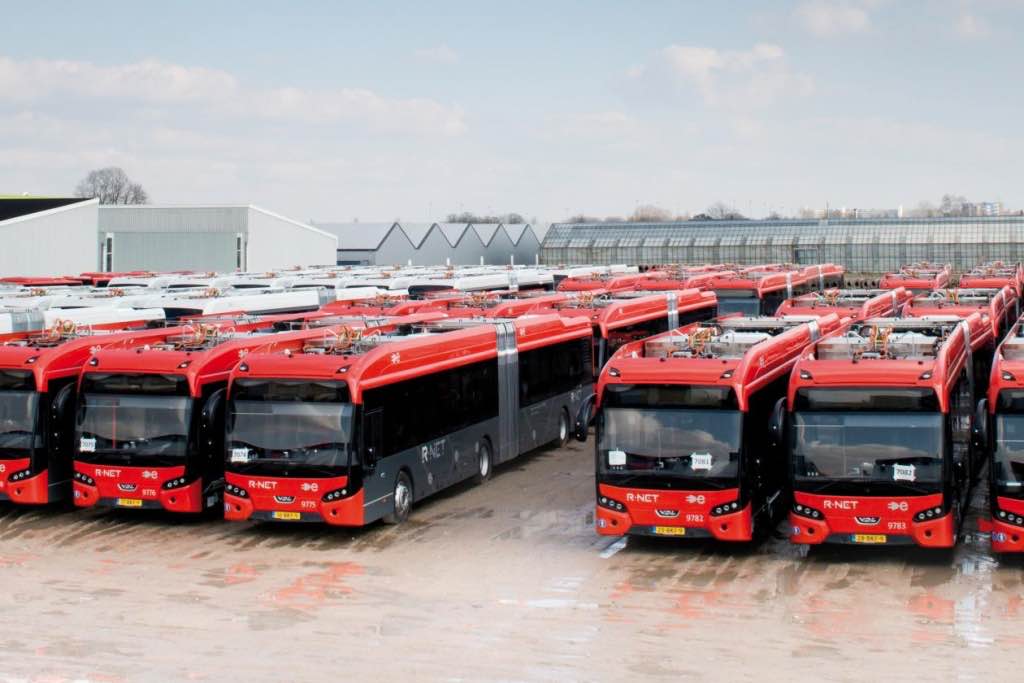
The order of electric buses for Amstelland Meerlanden‘s electric bus fleet is still the largest single order for VDL Bus & Coach, and with 100 electric buses it is the largest electric bus fleet within a single operation in Europe. The 100 articulated e-buses collectively cover up to 30,000 km per day. These batteries are charged in 20 minutes or less at charging points along the route, allowing 24-hour service.
And Amsterdam city center is no exception. The first vehicles were delivered in spring 2020 in the city. And more are to come: the deal signed in December 2018 between the carrier and VDL Bus & Coach consists of no less than 31 electric buses, 9 12-meter and 22 articulated ones. And there is also an option for 69 extra electric buses.
Rotterdam and electric bus. And Keolis with a major order…
In 2018, the Dutch manufacturer VDL Bus & Coach has been award with a 55 units of electric bus contract by Rotterdam public transport operator RET. During the same year 2018, also the Dutch public transport company EBS put 10 units of the electric bus VDL Citeas SLFA-181 in service.
Remaining in the Netherlands, in The Hague, Heliox delivered to HTM a fast charging system for the charging operations of 9 VDL electric buses.
As of November 2020, more than 750 VDL Citeas Electric operating in Europe have covered a total of 75 million electrically driven kilometres. And a new generation Citea range is on the launching pad: it’ll be presented at Busworld 2021.
Netherlands leading Europe on electric bus adoption
However, VDL, though being the main, is not the only player in the Netherlands: Syntus (Keolis group) officially inaugurated in 2018 two BYD electric buses for Amersfoort.
Dutch electric bus market is clearly on the rise and at the forefront in Europe. In 2015, the leaders of the PTAs in the Netherlands came to an agreement. From 2025 on, newly bought buses for public transport can only be emission free. In early 2020 10 percent of the Dutch fleet is already electrified. And this rapid growth brings several challenges and opportunities.
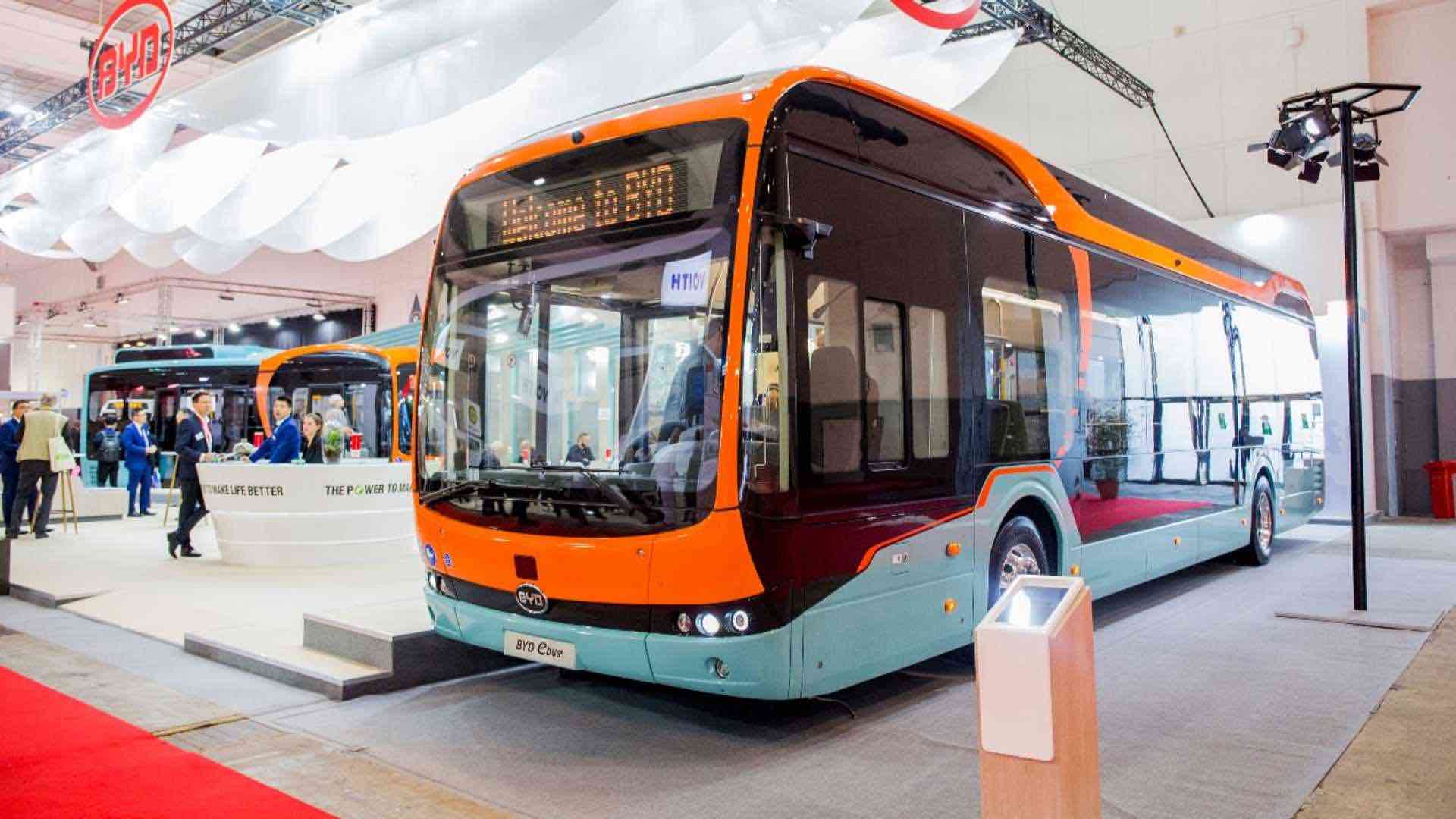
In March 2019, it has been made public that more than 160 electric buses will hit the streets of the new concession Groningen-Drenthe. The public transport operator Qbuzz, owned by Italian railways FS, will receive the large batch of vehicles from three manufacturers: the largest fleet will be provided by Ebusco with 60 ebuses, while VDL will provide 43 zero emission vehicles and Heuliez Bus further 59. These 162 buses will join 10 VDL ebuses already in operation.
In September 2019 Keolis has been awarded a new concession in the provinces of Veluwe, Central Overijssel and Lelystad for the period 2021 – 2030.
Following this new contract, Keolis awarded BYD with the largest single order so far secured in Europe for this kind of technology: 259 BYD battery-electric buses will be deployed.
Electric bus fleets in UK, Stagecoach docet
105 new double decker units of electric bus have been introduced in the fleet between 2019 and 2020. It’s the plan revealed by the British operator Stagecoach in September 2018. The investment will be around £56m (34.6m from the company, 21.5 from the government). Enviro400 EV City by ADL – BYD is the electric bus model involved in the project.
Electric public transport back in Glasgow
In the first days of 2019, Stagecoach received its first electric buses by ADL – BYD, ready to be deployed in Guildford. And electric buses have been also launched in Glasgow. Friday 10th January 2020 has been the first day on the road for the two 10.8-meter zero emission vehicles produced by the joint venture between ADL and BYD.
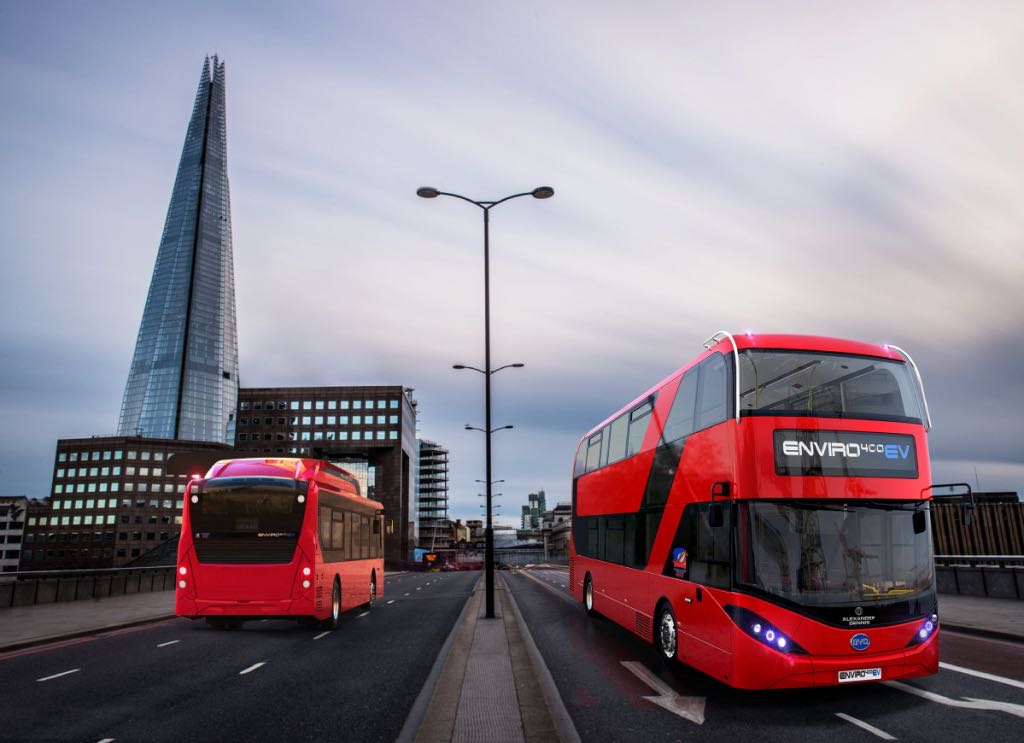
Electric bus adoption and smart garage in London
As widely known, London is the leader of the transition to electric buses in the UK. BYD and ADL delivered in November 2018 a 36 vehicles electric bus order in the capital city.
But the big news is not necessarily this one. What is also very interesting is that the companies, together with the strategic partner SSE, transformed the historic and land-locked RATP Dev Shepherd’s Bush garage in West London into an advanced, smart electric bus operating centre, that is expected to become the company’s first zero emission bus garage in London.
According to the plans, by 2037 all buses in London (about 8,000) will be zero-emission. As a further step towards this goal, 34 CaetanoBus electric buses will hit London roads for the operator Abellio from March 2020. These will be the first Caetano electric buses for the UK.
First Bus: electric bus deployment for Oxford
In early 2024, the Go-Ahead Group announced it has joined partners in Oxford to launch one of the UK’s biggest fleets of electric buses. A £82.5 million project will deliver 159 battery buses onto the streets of Oxford – the first of which have already gone into service, Go-Ahead states.
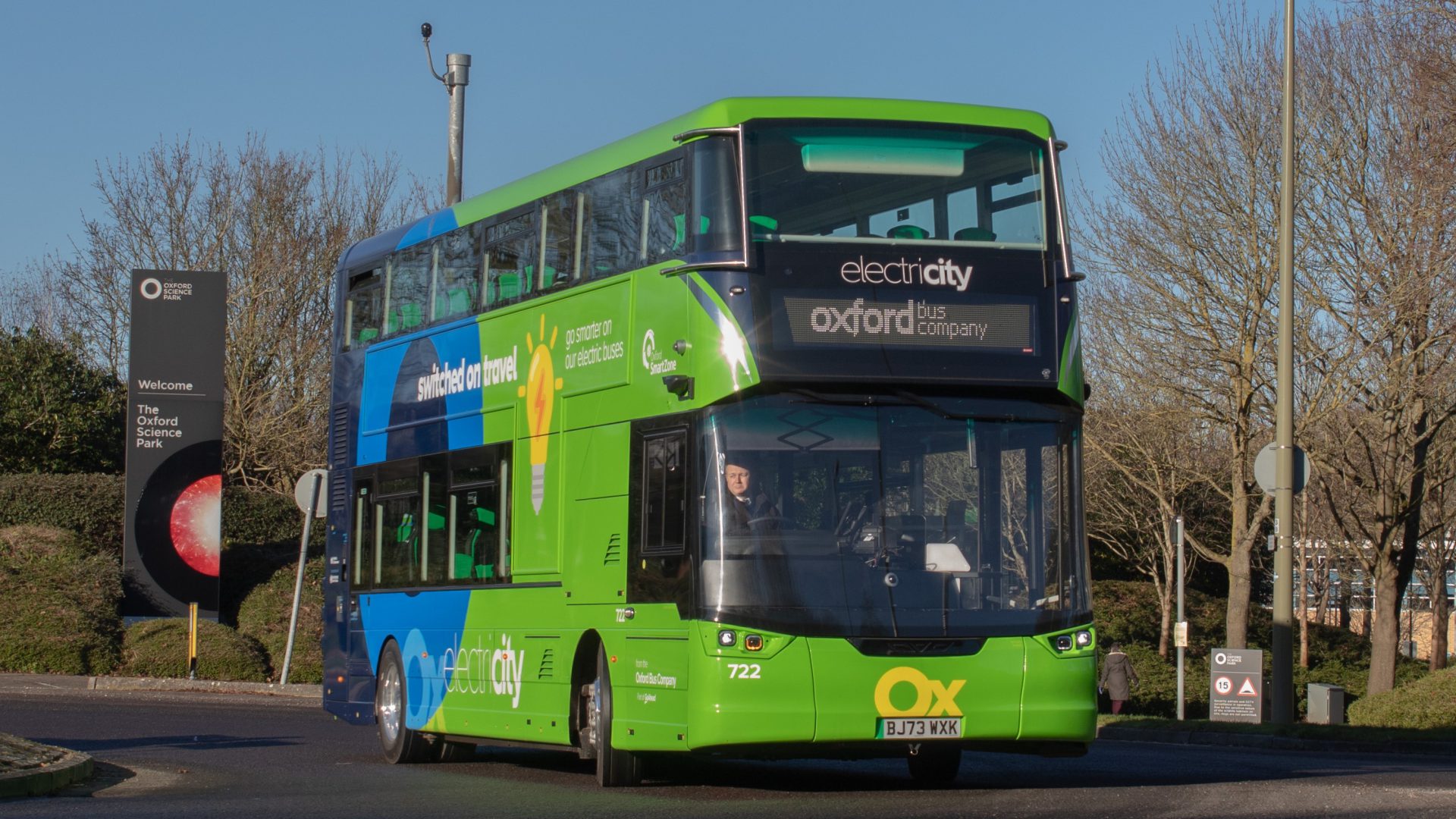
Go-Ahead had been celebrating 10 years of electric bus operation in London in late 2023: the company operates 520 zero emission buses on behalf of TfL and expects to increase this number to 1,000 by the end of 2026 – account for almost half the company’s fleet. According to plans, Go-Ahead’s entire fleet of 5,000 UK buses will be converted to zero emission vehicles by 2035. It’s just one of the pillars of the company’s strategy to reach carbon neutrality by 2045.
Solaris, large electric bus contracts in 2019
One of the European leader in electric bus manufacturing is Solaris Bus & Coach. The company, Polish-based although taken over by Spanish group CAF, will reinforce the fleet of Hamburg public transport operator Hochbahn with 10 Solaris Urbino 12 electric. The Senate of Hamburg has decided that, as of 2020, all buses bought by local carriers should be electric zero-emission vehicles.
Several deliveries were performed by Solaris during 2018: three articulated vehicles went to Barcelona (where also two Irizar ie tram were supplied to TMB), five Urbino 12 Electric inaugurated Frankfurt’s transition plan with deadline 2030, the first units of zero emission bus were delivered to Baltic countries (Latvia).
…and 2019? In this year Solaris has won a 130 electric bus units contract in Warsaw and a 250 framework agreement in Milan. “25 per cent of electric buses awarded in 2019 in Europe are made by Solaris“, claimed the company as of September 2019.
And the first intercity electric bus is coming!
Not to forget the major order of no less than 107 electric buses from BVG Berlin. The first vehicles has started operation in spring 2020, the operator states. To be specific, 90 12-meter and 17 18-meter vehicles are set to roll out. All the buses are to be delivered by the end of this year, according to schedule. Also 15 Mercedes eCitaro have been delivered.
In October 2020 the Polish brand unveiled its first electric intercity bus. The Urbino 15 Low Entry Electric stands out for being based on a platform designed only for electric technology. It can be deployed both in Class I and Class II routes. The vehicle will be tested in regular operations for the first half of the 2021. In late 2023 Nobina has placed an order for 55 electric 15-meter regional buses from Solaris, scheduled for delivery in the fourth quarter of 2024.
Solaris is betting strong on Class II intercity e-bus development: in September 2023 the company hired Luca Cordiviola as Interurban Platform Director, with the goal of expanding the zero emission bus offer.
What is more, Solaris ended 2020 assessing itself as the European market leader for electric buses: the group increased from 162 e-bus registration in 2019 to 457 in 2020, with a +187% increase.
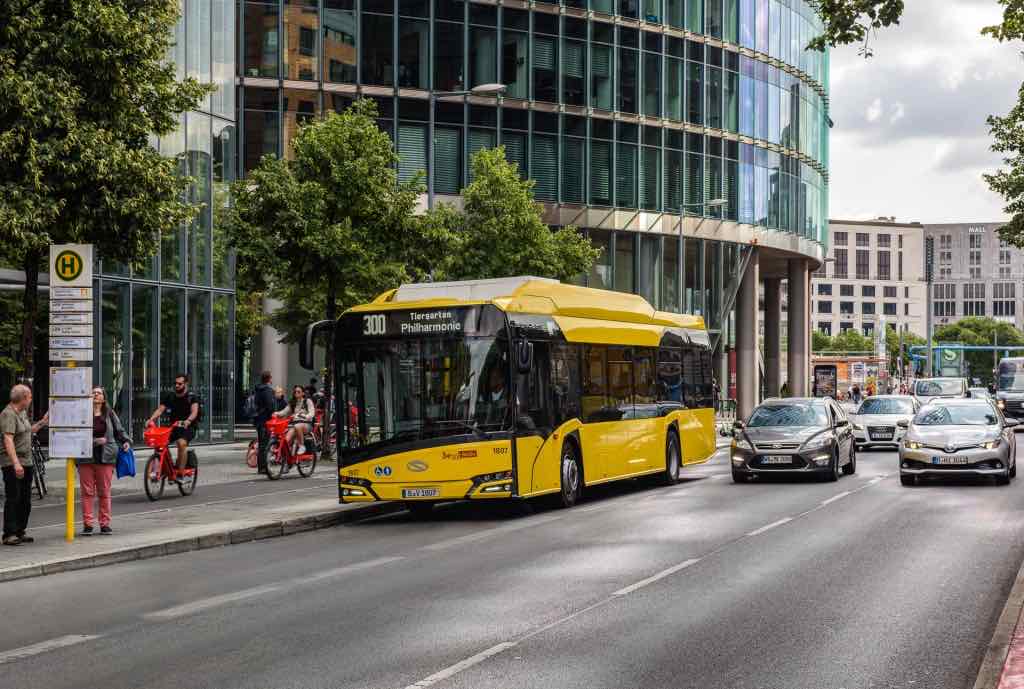
Volvo, the voice of electric bus in the Nordics
Volvo Buses has been the first manufacturer to stop the production and commercialization of dieseI buses for European market, at the moment of the entrance into force of Euro VI standard.
Volvo hometown, Gotheburg, has taken the lead in the transition to zero emission bus system in Sweden. Volvo Buses, indeed, in 2018 received an order for 30 electric buses 7900 from Gs Buss, subsidiary of Göteborgs Spårvägar, and Public Transport Authority Västtrafik. It was the biggest order so far for all-electric buses in Sweden (former biggest order was the one received by VDL from Umeå municipality, consisting of 25 e-buses).
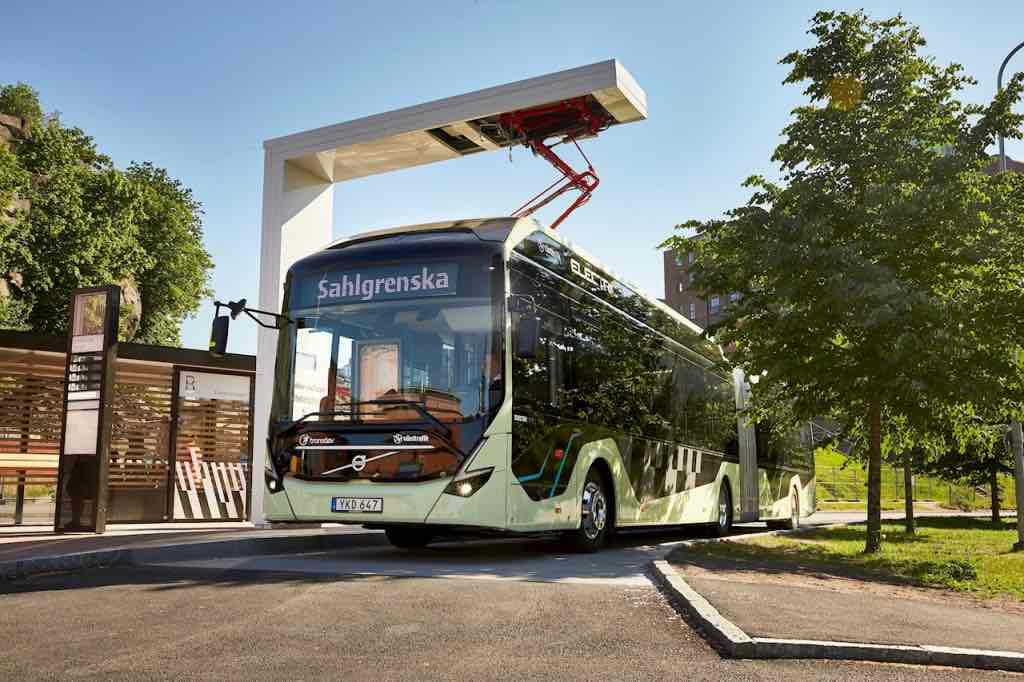
Volvo Buses announced also the sale of 23 electric buses to Leiden in Netherlands (for Arriva) and another 17 to Oslo. In the capitol city of Norway will run also 40 electric buses by VDL and 42 by BYD.
At Busworld Europe 2019, Volvo unveiled the Volvo 7900 Electric Articulated, finally ready for serial production. It features a new driveline (in-wheel electric motor developed in house) and more battery capacity, that can reach up to 396 kWh.
Big changes were announced in 2023. Volvo Buses communicated the decision to cease the production of complete buses, both urban and coach, in Europe. Then, the manufacturer signed letters of intent with MCV for the manufacture of bodies for city and intercity buses, and with Sunsundegui for tourist buses.
The first order for 15 Volvo 7900 Electric buses with MCV – Manufacturing Commercial Vehicles as coachbuilder was secured in December 2023.
The first European plant just for electric bus. By Irizar
Irizar, on its side, inaugurated on 11th of May 2018 the first European plant totally dedicated to electromobility. 18.000 square meters of gross floor area on 4 hectars plot, situated in the town of Aduna, Gipuzkoa (close to San Sebastian) is the place where Irizar is building, and will build, all its electric vehicles and parts.
Irizar is the first European manufacturer of buses to boast a plant focused on emobility and, furthermore, to build the whole electric bus, components included, in house, thanks to the different companies of the group.
The inauguration of Aduna plant has also been the occasion to present to press and customers from all over the world the first truck manufacturer by Irizar: the ie truck. Electric, needless to say.
Ten electric buses ie bus by Irizar have been purchased by Voyages Emile Weber group in Luxemburg. Six of them have just been put into service, the others will arrive by the end of 2018. Still in the same year 2018, Irizar e-mobility signed a contract with RDT 13 that includes the delivery and the maintenance of 15 units of Irizar ie tram electric bus, belonging to the last generation of electric buses realized by the Basque manufacturer. The vehicles will be deployed on the roads of Aix en Provence.
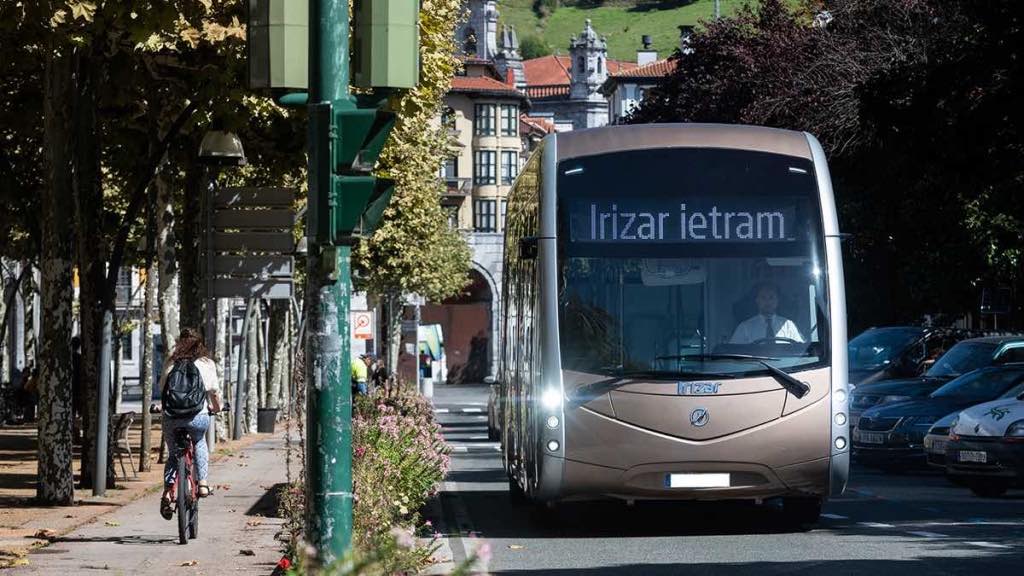
In May 2019 Amiens Métropole and Keolis launched what they claims to be “the first electric BRT in France”. The service is operated by electric buses on four new rapid transit routes. The buses involved in this project are 43 model of Irizar ie tram that are now part of a fleet of 136 buses deployed in the city.
Irizar in 2020: electric bus orders from France, Italy, Germany
In 2020 the company, whose electric bus portfolio is made of the Irizar ie bus (the range has been updated in late 2019) and the Irizar ie tram, got significants order from Orlèans, in France, and its second commercial successes in Germany, namely Frankfurt (after supplying 10 vehicles in Dusseldorf).
The Spanish producer has also been awarded an order for 14 e-buses in Genoa in February 2020, and 49 e-buses for Strasbourg in October. Also a third order was placed by EMT Madrid, in the domestic market: 20 Irizar zero emission buses will operate in the capital city.
Mercedes eCitaro, the electric version of a besteller
Mercedes eCitaro is going to change the balances of the market. While VDL, Solaris, Volvo and Irizar began in advance to realize electric buses, other big manufacturers such as Mercedes, MAN and Iveco are going to start electric bus production in 2019-2020. In summer 2018 Mercedes showcased the eCitaro, its first battery electric bus, before the world premiere at IAA 2018. The serial production will begin by the end of 2018. The electric bus is moved by ZF electric portal axle AxTrax (formerly known as Ave130). The electric Citaro features a innovative thermal management.
Two orders, in the very first months, has been placed: one from BVG Berlin for 15 units, the other from Hamburger Hochbahn for 20 vehicles.
The first units of eCitaro were delivered in the last days of 2018 and the first of 2019. The very first series production model of Mercedes’ electric bus was supplied to Hamburg. BVG Berlin followed and then Mannheim and Heidelberg, where three Mercedes eCitaro are operating for Rhein-Neckar-Verkehr GmbH. Mercedes eCitaro has also been challenging with Solaris Urbino 12 Electric for a 250 electric bus tender issued by ATM Milano, finally awarded to Solaris. Hanover will have 48 Mercedes eCitaro in operation.
In addition to the many units delivered in the domestic market, the eCitaro has been awarded a contract of 92 units in France, for the STAR network in Rennes. A major order, with similar volume, was awarded in 2023 in the Netherlands: the Hague’s operator HTM will deploy 95 Mercedes-Benz eCitaro buses and associated charging infrastructure. The same year 2023 saw Daimler Buses achieving the milestone of 1,000 eCitaro units produced. In the future, the model will be produced also in France, while Mannheim will remain the electromobility hub of the group. And 70 units of the articulated version have been ordered in Brussels. In Vienna, the eCitaro is set to put its footprint on regional operations as well.
However, Hamburg remains an hotspot of eCitaro deployment: in March 2023, in the largest e-bus tender in the company’s history to date, Verkehrsbetriebe Hamburg-Holstein GmbH (VHH) has awarded MAN Truck & Bus and Daimler Buses two framework agreements for 100 and 250 e-buses respectively.
In 2023 Daimler Buses has secured its first e-bus order from UK.
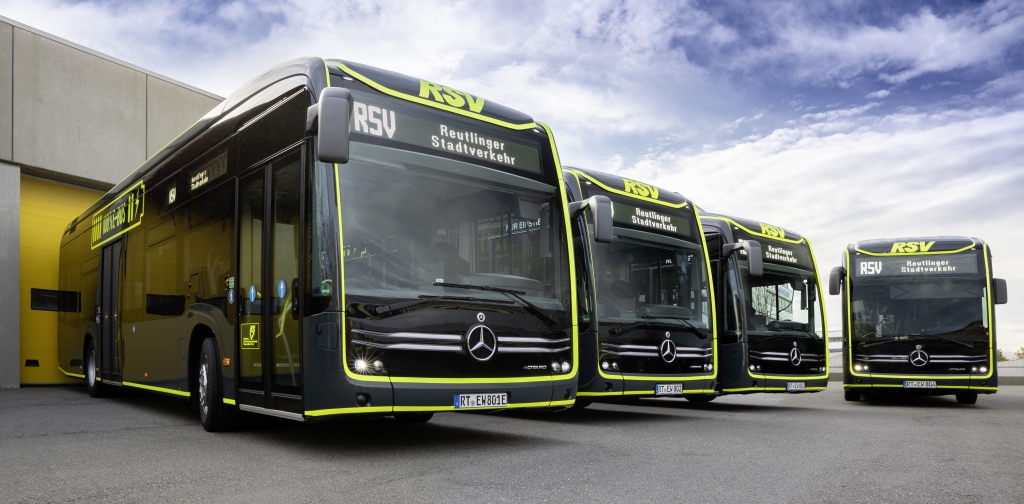
eCitaro, the battery is constantly updated
Focusing on the technological topic, in 2021 battery was updated to new NMC generation, still from Akasol. The other option available on the eCitaro, when it comes to batteries, it’s solid-state technology from Blue Solutions (although the first units have been recalled for checks). This paved the way for the launch of the eCitaro G articulated bus.
The latest milestone came in late 2022 with the introduction of the third-generation high-performance lithium-ion batteries, boosting the solo bus driving range to up to 280 kilometers. Supplier has not changed: Akasol, now part of BorgWarner group.
The electric bus by MAN. The launch in 2020
And what about MAN? The Lion’s City E, also presented to the public at IAA 2018, will be equipped with central electric motor and depot charging. The first mass-produced MAN Lion’s City E 12-metre solo-version buses are set to be delivered to customers in the fourth quarter of 2020.
The battery size is a real surprise: with 480 kWh for the solobus and 640 kWh for the articulated, MAN Lion’s City electric is an absolutely unique case in a context that sees battery usually ranging from 240 kWh to 350 kWh. The company is operating on the assumption that around 66% of scheduled-service buses will be electric by 2030.
In September 2020 Nobina Sverige AB, Scandinavia’s largest bus operator, has placed an order with MAN Truck & Bus for 22 MAN Lion’s City E buses. An order that follows the very first one, landed in Hamburg for 17 units of the 12-meter vehicle.
In the same Q3 2020 MAN has unveiled for the first time the articulated MAN Lion’s City 18 E. MAN Truck & Bus will also hand over the articulated e-bus to the transport operators Kölner Verkehrs- Betriebe AG (KVB) in Cologne and Transports Metropolitans de Barcelona (TMB) in Spain, in order to conduct scheduled practical testing and to gain ample experience.
In mid 2022 MAN shared some figures concerning the market uptake of the Lion’s City E: 700 units ordered.
In late 2022 Norwegian transport operator Unibuss has ordered 76 Lion’s City E from MAN Truck & Bus – including 59 solo and 17 articulated buses (the first ones ordered in Norway). 45 units are also on their way to Copenhagen. Gothenburg and Stockholm have also landed orders with MAN.
2023 has been the year of the launch of the 10-meter model Lion’s City 10 E, at Busworld Brussels awarded with the Sustainable Bus Award 2024. In the standard configuration with three double doors there is room for 27 seats plus a wheelchair platform, plus about fifty standing places, for an overall capacity of around 80 passengers, in line with ICE buses of the same length.
As anticipated, the 10E takes advantage of the new MAN city bus range modular design and, by only shortening the wheelbase, brings the overall length to just under 10.6 meters. These proportions allow it to have a very small turning circle, similar to that of shorter buses where the rear overhang is reduced.
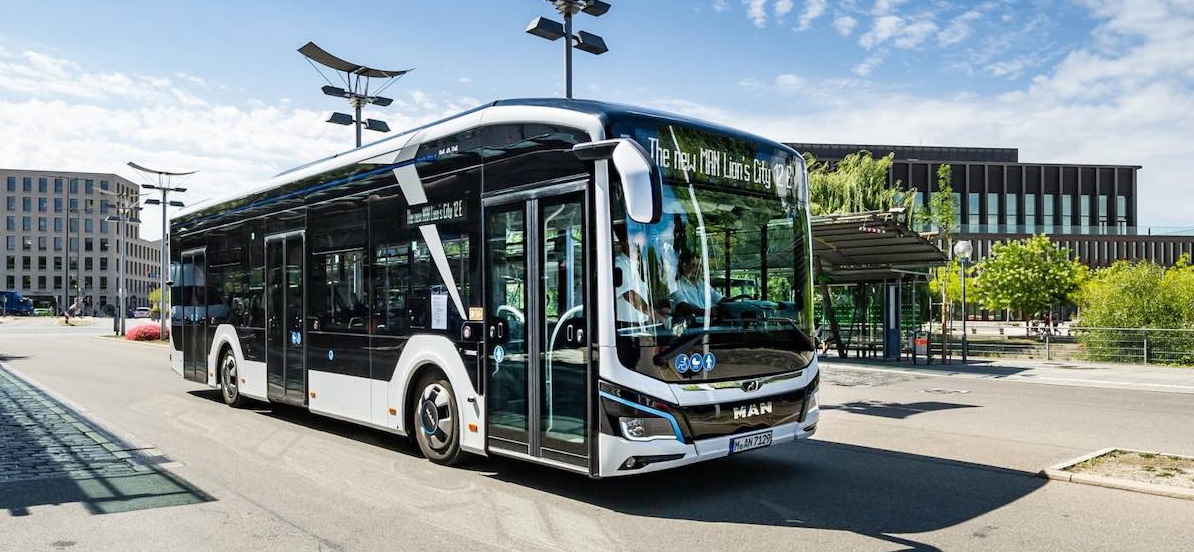
Scania e-bus toward serial production
Three Scania Citywide LF electric have been tested since the end of 2017 in the Swedish northern city of Östersund on a 14 km line equipped with two charging stations at both ends of the line. The electric bus has been shown at IAA in Hannover in november 2018, where Scania unveiled the first LNG coach in the world. Following six-month trials of the battery electric Scania Citywide in the northern Swedish city of Östersund, results are encouraging and Scania said it is moving forward toward serial production. In early 2019 other three electric buses will be added to Nettbuss’ network.
But the Scania electric bus that will definetely go in series production won’t be like the ones deployed in Östersund. The new generation Citywide range has been unveiled at Busworld Europe 2019 in Brussels. Where the Scania Citywide BEV has been showed for the very first time. In November 2020 Vy Buss announced a new order for 10 Citywide BEV to be in operation in Östersund.
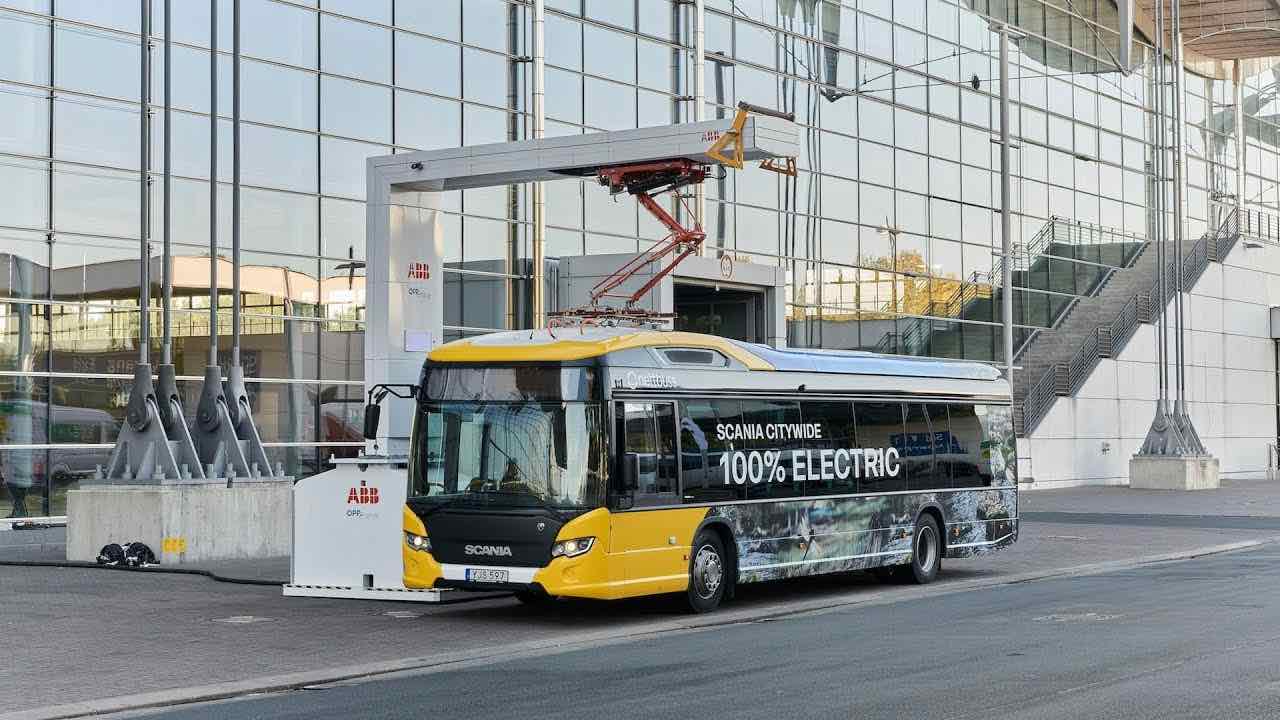
Iveco Bus: a growing role in electric bus deployment
Heuliez Bus is the brand of CNH Industrial that produces, in the French plant in Rorthais, electric and hybrid buses, beyond those fuelled with diesel and gas. The plant employs 420 people, of whom 10 per cent are engineers. The 12-metre and the articulated electric bus (named GX 337 Electric and GX 437 Electric respectively) are driven by an asynchronous central electric motor built by the English company BAE. The vehicle has been chosen by Stadtbus Rottweil for the local public transport in the city of Rottweil (Baden-Wuerttemberg).
The company resulted one of the three winners of the largest call for tender on e-buses issued in Europe so far, in Paris and is already delivering vehicles in the French capital city following a previous tender. In early 2020 Heuliez Bus delivered 11 GX 447 Elec in Norway.
What is interesting is that at Busworld Brussels in October 2019 Heuliez Bus zero emission bus range was announced to be rebranded as Iveco e-Way.
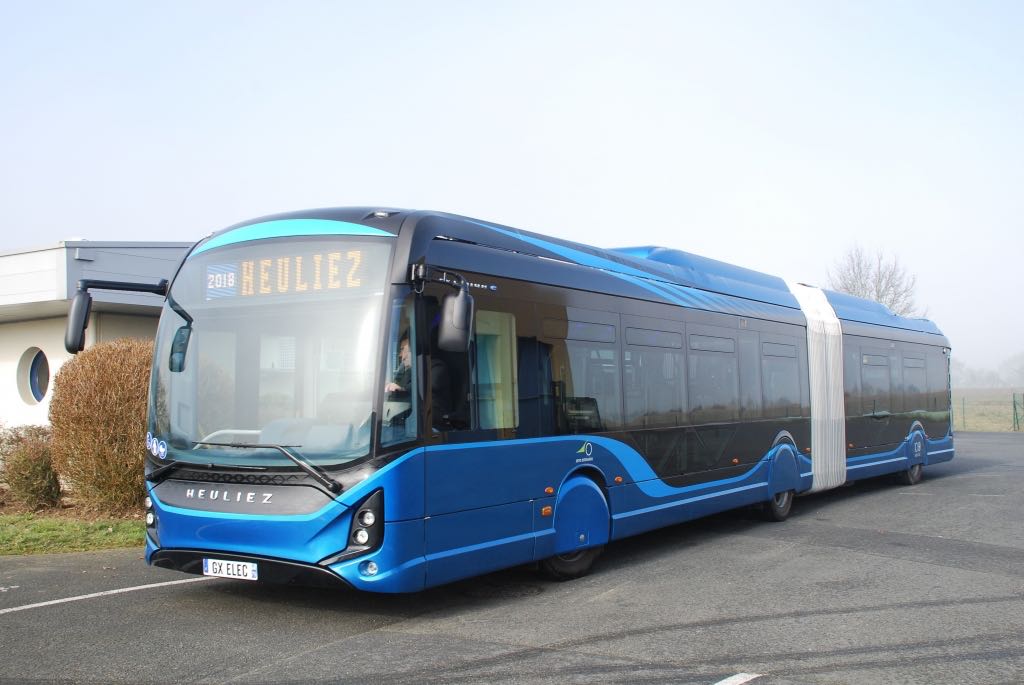
And India? An interesting electric bus market
What’s going with regards to Indian electric bus market? With over 70,000 buses above 6 tonne sold last year, the Indian bus market represents a significant portion of the 430,000 buses above 6 tonne sold globally. If only a small percentage of these were to be electric, it could easily become the second largest market behind China.
The consulting company Interact Analysis have been tracking publicly confirmed orders for city electric buses totalling 932 units as well as publicly stated intentions to order a total of 1243 units since the start of 2018 to October of the same year. Excluding China, this accounts for more than 24.9% of the global orders we’re tracking.
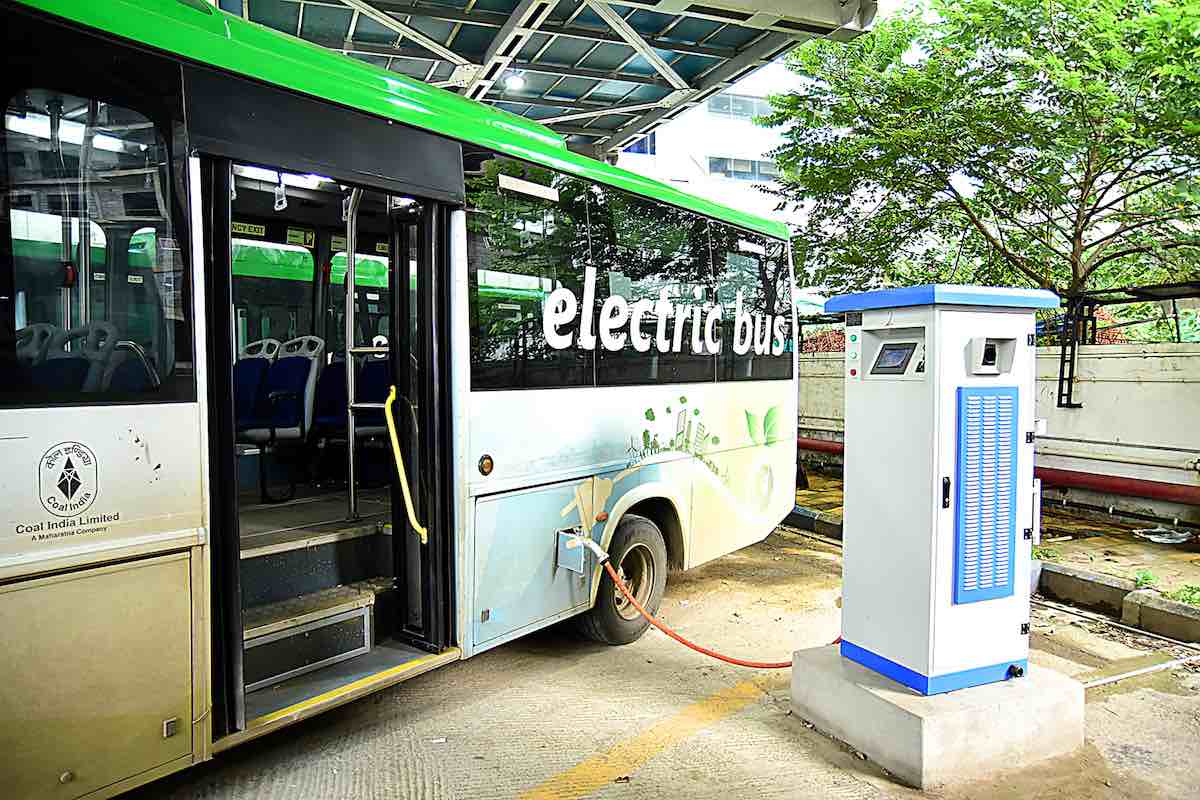
In US electric bus adoption + 83% in 2017
According to the consulting company Eb Start Consulting, during 2017 the number of electric buses delivered to US public transit agencies grew 83 percent (182 electric buses in service at 1/1/17, 383 one year later). Although market penetration remains low at about 0.5% of the total U.S. public transit bus market, 9% of all transit agencies either had electric buses in service or on order at the end of 2017. The market leaders? Proterra and BYD, both of which have recently tripled their manufacturing capacity to keep up with the demand. New Flyer come third.
Things are changing in the US
In 2018 Foothill Transit (that operate just outside Los Angeles) has ordered its first double decker electric bus (and first double decker as well). A double premiere on the streets of the Californian city. The buses will be realized by Alexander Dennis, a real authority in the field, with Proterra’s battery system and drivetrain technology, and will hit the road from 2019. IndyGo, the largest public transportation provider in the American state of Indiana, and BYD announced the delivery of the first K11 60-foot (18 meters) battery electric bus to serve Indianapolis. The bus is the first of 13 ordered for the Red Line by IndyGo (also 18 electric buses have been reportedly ordered for the planned Purple Line).
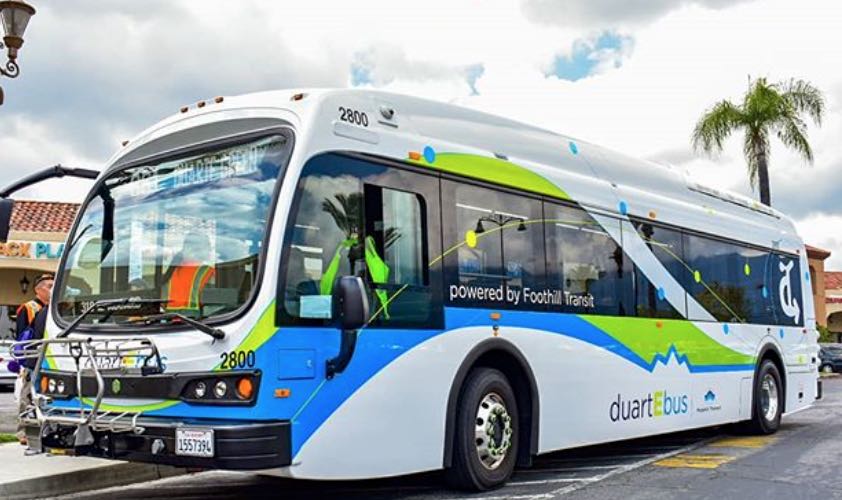
Electric bus in the US? A clean choice!
Across the United States, an electric bus has lower global warming emissions than a diesel and natural gas one, even in cities with power grids that depend on coal and natural gas power plants, according to an analysis released in 2018 by the Union of Concerned Scientists (UCS). The study found that an electric bus produce less than half of the global warming pollution of diesel or natural gas bus on average. If a diesel bus attained 12 miles (instead of 4,8) per gallon… then it would be as clean as an electric bus, according to UCS’s study.
Proterra and Daimler for US electric school bus market
Proterra and Daimler look at the electrification of North American school bus market. Together. At IAA Hannover 2018 Proterra announced that it has closed a $155 million investment round co-led by Daimler, the world’s largest manufacturer of commercial vehicles. Tao Capital Partners co-led the round, joined by G2VP and other technology investors. Proterra and Daimler have entered into an agreement to explore the electrification of select Daimler heavy-duty vehicles.
And the launch of the first electric school bus realized by Proterra and Thomas Built Buses (subsidiary of Daimler Trucks North America) together was officially announced by Proterra in the end of October during the 44th Annual National Association of Pupil Transportation (NAPT) Conference.
In early 2020 Thomas Built Buses and Proterra welcomed the first large order for the jointly developed electric school bus Jouley.
Tesla to build electric bus? No, thanks
Electric buses around the world will reduce demand for diesel by 270,000 barrels by the end of 2019. Three times the displacement of all electric passenger vehicles in the world (a market where Tesla has a share of about 12 percent). The outcome of a Bloomberg New Energy report, in 2019, has created a great stir and put in the spotlight the fact that the transition to electric vehicles, in this early phase, is driven by buses.
In recent years, news have often been circulating with regards to the possibility that Tesla might begin to manufacture electric buses. Or to cooperate with other companies in the market of zero emission buses. We at Sustainable Bus tried to sum up the history and the evolution of the relationship between Tesla and electric buses.






